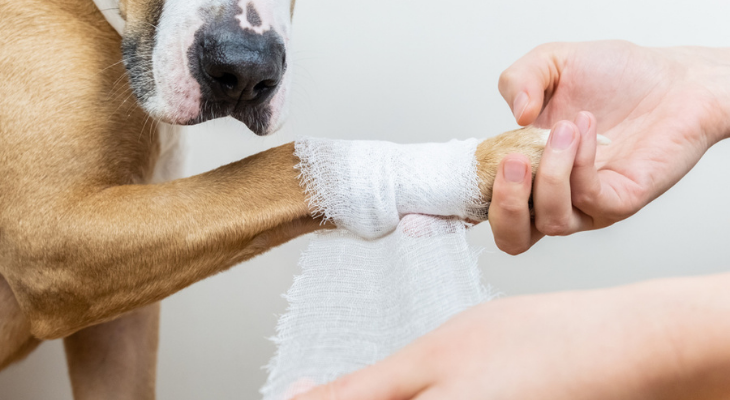
First Aid Tips For Pet Owners During Pet First Aid Awareness Month
Do you know how to help your pet in an emergency? Fortunately, many of the same first aid techniques you use to care for your family's injuries can also help your pets. National Pet First Aid Awareness Month, celebrated every April, is the perfect time to review your first aid knowledge for these common pet injuries:
Wounds
Minor cuts can be treated at home, although deep lacerations, bite wounds, or cuts that won't stop bleeding require an emergency trip to the veterinarian's office. Rinse the wound with warm water to remove debris. If the cut is still bleeding, cover it with a clean cloth or piece of gauze and apply gentle pressure for a few minutes.
Once the bleeding stops, clean the wound with chlorhexidine or povidone-iodine, cover it with a thin layer of antibiotic ointment, and bandage it. You may need to trim your pet's fur in order to clean and bandage the wound.
Heatstroke
Just like people, pets can experience heatstroke on hot, humid days. Signs of heatstroke in pets can include:
- Panting
- Drooling
- Trouble breathing
- Unusual thirst
- Fever
- Glazed eyes
- Bright red gums
- Vomiting
- Fast heart rate
- Diarrhea
- Vomiting
- Confusion
- Collapse
- Seizures
After you bring your pet inside, pour cool water all over it or place cool towels on it. The water should be cool and not cold to prevent shock. Offer your pet water, then carry your furry friend to the car and make your way to the veterinary office. Heatstroke is a medical emergency that requires prompt treatment, even if your pet seems to be recovering.
Soft Tissue Injuries
Does your dog seem a little sore after playing at the dog park or a vigorous agility training session? It may have a bruise or strained or sprained muscle. If your pet will tolerate it, place an ice pack or heating pad over the injured area. Limit your companion's activity for a day or two following the injury. If your pet seems to be in pain, limps, or has trouble moving a limb, give the veterinarian a call.
Broken Bones
Although broken bones can't be treated at home, there are a few things you can do to keep your pet comfortable while you get ready for the trip to the vet office. Gently pick up your pet and put it in a pet carrier to prevent unnecessary, painful movement. If your pet is too injured to put in a carrier, make a stretcher from a board, door, boogie board, or another item that won't bend.
Splinting isn't usually necessary unless the limb seems unstable. If that's the case, use non-adhesive tape to gently attach the limb to a stiff, straight object, like a Popsicle stick or rolled-up magazine.
Poisoning
If you think that your pet has eaten something it shouldn't, call your veterinarian or the ASPCA's Animal Poison Control Center at (888) 426-4435 for advice. If the substance is toxic, you'll need to take your pet to the veterinarian immediately. Don't try to make your pet vomit or give it activated charcoal without checking with your veterinarian first. In some cases, these actions can worsen your pet's condition.
Things to Keep in Mind
These tips will help you provide the best care for your sick or injured pet:
- Protect Yourself. Severe pain can cause your pet to lash out and scratch or bite you. It's a good idea to put a muzzle on your dog or wrap a towel around your cat. Don't wrap the towel too tightly and don't use it if you think your cat has a broken bone.
- Don't Pull Out Protruding Objects. Does your pet have a piece of glass protruding from its paw or a stick stuck in its side? Pulling out the object could increase bleeding or worsen the injury. Let your veterinarian safely remove the object instead.
- Keep a First Aid Kit on Hand. Assemble a first aid kit just for pet emergencies. Add gauze, non-adhesive bandages, self-adherent wrap tape, cotton balls, activated charcoal, antibiotic ointment, iodine, scissors, styptic powder, and ice packs to your kit.
Get in touch with our office right away if your pet has an injury. Whether your furry friend is suffering from a cut, heatstroke, a sprain, or broken bone, prompt treatment is essential.
Sources:
American Veterinary Medical Association: Pet First Aid – Basic Procedures
dvm360: The 3-Tiered Approach of Treating Heatstroke in Dogs, 6/29/2018

